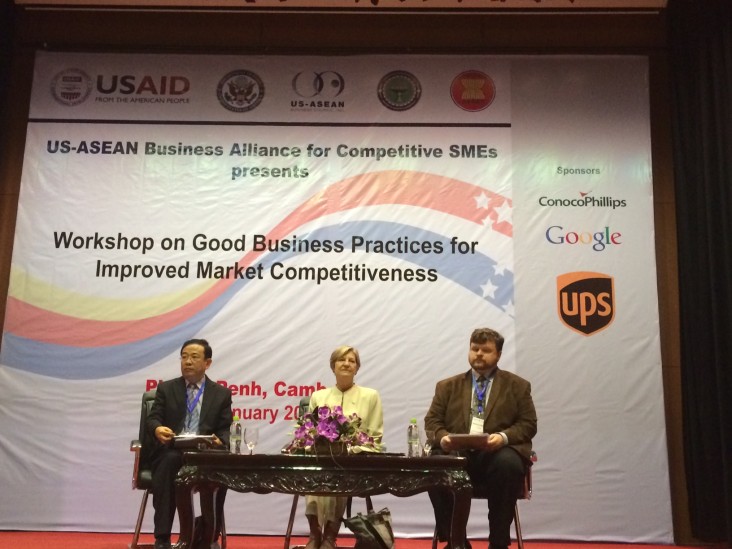
Mr. Yea Bunna, Deputy General Director of Small and Medium Enterprise and Handicraft, Ministry of Industry and Handicraft
Representatives from the US-ASEAN Business Council
Distinguished Speakers and Guests
Ladies and Gentlemen
Good morning. I would like to extend a very warm welcome to everyone here today. Thank you, Mr. Yea Bunna, for gracing this occasion and for your inspiring remarks. These will certainly set the context and tone for the workshop proceedings to come.
I am also very pleased to see so many participants from the SME sector and to see so many women and young entrepreneurs. The elimination of gender economic disparities and the promotion of young entrepreneurship are some of our top priorities for us. We will continue to work with all our partners to achieve such inclusive development.
And in that regard, I wish to express my deep appreciation to the many partners who have invested so much to make this event happen today. Among these partners are the Ministry of Industry and Handicraft, the US-ASEAN Business Council, the Japan International Cooperation Agency, the Cambodia-Japan Cooperation Center, the Cambodian Women Entrepreneurs Association, the Cambodia Women Business Federation, the Young Entrepreneurs Association of Cambodia, and my USAID colleagues.
Small and Medium-sized Enterprises are the backbone of almost all economies in the world. Their essential contribution to sustained and broad-based development has become even more indispensable in the regional and global economy of today. This is particularly the case in ASEAN, with each member nation having between 52 and 97 percent of its domestic employment within the SME sector. Here in Cambodia, a recent report from the Economic Research Institute for ASEAN and East Asia puts SME employment at 73 percent of the domestic work force.
2015 will be a historic year for the region with the formation of the ASEAN Economic Community. For the past seven years, ASEAN member states have been working toward this Community and its free flow of goods, services, investment, labor, and capital. This effort has successfully deepened regional economic integration. For example, intra-ASEAN tariffs will fall to nearly zero for the vast majority of commodities and intra-regional trade reaching $609 billion.
The ASEAN Economic Community offers a wealth of opportunities to firms that are ready to embrace the challenges of regional trade. But you are not limited to working within ASEAN. The global economy presents a wide range of opportunities as well. Free trade agreements, like those signed by ASEAN and partner countries, have made the world economy virtually borderless. In the process, an ever larger proportion of domestic production is traded across borders. Such trade increased from 19 percent of global GDP in 2002 to 24 percent in 2012. Cross-border trade is projected to triple in value by 2025 from a value of $17.8 trillion in 2012.
The expanding and integrating regional and global economies have opened up entry points to a far broader range of competitive enterprises and industries across the world. Individuals and entrepreneurs can now source materials, produce, brand and market their goods and services online, gaining access to the global market,. However, new knowledge, skills, and tools are needed to improve products and services, especially by all the budding micro-supply chain partners and micro-multinationals among you.
I am pleased to note that the corporate partners in this workshop are the premier global players in cross-border trade, investment, and logistics. They also represent the world of technology and are intimately familiar with the legal dimensions of cross-border transactions. They have successfully groomed business talent and leadership. Their collective hands-on experience and insight are, perhaps, unrivalled in scope and depth. You have a tremendous opportunity to learn from them and their experience. I encourage you to interact, network, and make the best use of the top-notch expertise on tap here today.
I commend the US-ASEAN Business Alliance for Competitive SMEs for mobilizing world-class resources for this important and timely workshop. For their generous support and participation, let me express my appreciation to ConocoPhillips, Google, UPS, VISA, Hinrich Foundation, Google, Sciaroni & Associates, Khmer Sedge Designs, and SentoSaSilk.
The United States is a solid stakeholder in the Business Alliance. We will continue to support similar training workshops across the ASEAN region. Our goal is to assist SMEs in Cambodia as well as those in other ASEAN member states to more fully develop emerging opportunities, and to overcome the inevitable challenges that are part of the international economy.
Have an exciting and fruitful workshop.
Thank you.
Related Speeches
- Remarks by Polly Dunford, Mission Director, USAID Cambodia, Training of Facilitators on the ASEAN SME Academy
- Signing of a Memorandum of Understanding between Power Africa and the Nile Basin Initiative - Remarks by USAID Kenya and East Africa Deputy Mission Director Dr. Tina Dooley-Jones
- Government of Kenya Consultative Workshop on Accelerating Electricity Transmission Infrastructure Development through Public Private Partnerships - Remarks by USAID Kenya and East Africa Mission Director Karen Freeman







Comment
Make a general inquiry or suggest an improvement.